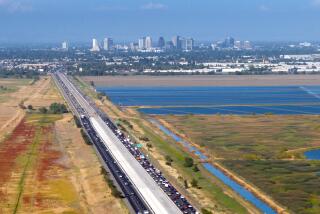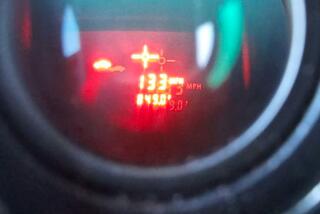3 Florida towns thrive on life in the fast lane : City officials protest their being labeled the nation’s only speed traps--all the way to the bank.
- Share via
WALDO, Fla. — With her squad car tucked out of sight between City Hall and the Cajun Mullet Man Smokehouse, Police Lt. Evonne Davis can sit behind the wheel catching up on paperwork while listening to passing traffic. And she knows from the sound if someone is speeding.
Of course, she has a radar gun too, and last Thursday her dashboard gun confirmed that the black Mazda RX-7 was doing 56 in a 30-mph zone. “Let’s get him,” said Davis as she rammed her cruiser into gear.
Within minutes the accelerating Mazda was well out of Waldo and Davis had flipped on her flashing blue lights and was on the far side of 95 mph before she caught the black car.
“Good afternoon, sir,” she said to the speeder.
As the driver who identified himself as Eric C. Bergelson, 34, fussed and fumed on the berm of U.S. Highway 24, Davis ignored his abusive tirade and calmly wrote out a citation, further boosting this crossroads community’s reputation as a bright star in an all-American constellation of speed traps. About half of Bergelson’s $178 fine goes to the Waldo town coffers.
In warnings to its 37 million members, the American Automobile Assn. uses the phrase “traffic traps” to describe Waldo and two nearby towns in North Florida, Lawtey and Hampton. Overzealous police write tickets in these towns at 10 times the rate of police in towns of comparable size, the AAA says.
The three towns, all situated along a 20-mile stretch of four-lane U.S. Highway 301, are the only designated speed traps in the nation right now, according to the AAA.
“What these towns are doing is not illegal, but it’s unethical,” said Kevin Bakewell, vice president of the AAA’s Auto Club South. “Their primary motivation is not law enforcement but to raise revenue.”
AAA members who request information on travel between Jacksonville and Gainesville are provided maps with “traffic trap” stamped alongside the three towns. The auto club also suggests alternative routes to U.S. 301 that add 49 miles to the journey.
City officials in Waldo, an Amtrak stop with half a dozen antique shops and 1,037 residents, do not deny that enforcing the traffic laws has been lucrative. During the last nine months of 1995, Davis and her five fellow officers handed out more than 4,373 traffic citations, which translates into $292,000 for the city. That’s 38% of the town’s annual budget and 155% of the police budget.
Lawtey, with a population of just 750, did even better. In the same nine months, police there wrote 4,775 tickets worth $318,000, or 63% of the city’s budget.
City officials bristle at the speed trap designation, however. The 30,000 motorists who pass through Waldo each day are given both fair warning of the speed limit and a margin of as much as 12 mph over that, according to Police Chief A.W. Smith.
“We are a small town, the crossroads of two major highways, and we have a duty to protect our citizens,” Smith said. He charges the AAA with being “out of focus when it comes to speed enforcement.” In protest, he has allowed his AAA membership to lapse.
In Lawtey, Police Chief Butch Jordan said: “AAA doesn’t know what they’re talking about.
“I’m tickled to death being able to do my job. We’re going to get even stricter, do more patrolling.”
Since the AAA first put the three towns on the national map last August, Hampton--population 260--has all but quit issuing speeding tickets after the town marshal balked at the rigid enforcement and at least one motorist threatened to sue. In fact, Hampton is well off U.S. 301, and only annexed a short section of the road last year so police could collect fines from speeders, according to a City Council member.
Two Florida state senators have complained about the possible economic fallout from the publicity, saying that the speed trap reputation could scare businesses from moving into the area.
Bakewell says he would like to see the towns strike a balance between issuing tickets and using “flashing lights or mannequins in police cars” to slow down motorists. “Our objection is that they just issue tickets and there is tremendous revenue being generated,” he said.
Responded Waldo City Manager Lee Vincent: “We are not ashamed of enforcing the laws. We have had no major accidents and no fatalities here last year and that was due to active enforcement of the speed laws.
“We are not a classic speed trap, in the sense of ticketing for one or two miles over the limit. So that offends me. But if people know us for strict enforcement, we welcome that.”
More to Read
Sign up for Essential California
The most important California stories and recommendations in your inbox every morning.
You may occasionally receive promotional content from the Los Angeles Times.













